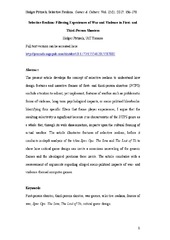Selective Realism: Filtering Experiences of War and Violence in First- and Third-Person Shooters
Permanent link
https://hdl.handle.net/10037/10829Date
2015-07-31Type
Journal articleTidsskriftartikkel
Peer reviewed
Author
Pötzsch, HolgerAbstract
The present article develops the concept of selective realism to understand how design features and narrative frames of first- and third-person shooters (F/TPS) exclude attention to salient, yet unpleasant, features of warfare such as problematic forms of violence, long-term psychological impacts, or socio-political blowbacks. Identifying four specific filters that frame player experiences, I argue that the resulting selectivity is significant because it is characteristic of the F/TPS genre as a whole that, through its wide dissemination, impacts upon the cultural framing of actual warfare. The article illustrates features of selective realism, before it conducts in-depth analysis of the titles Spec Ops: The Line and The Last of Us to show how critical game design can invite a conscious unraveling of the generic frames and the ideological positions these invite. The article concludes with a reassessment of arguments regarding alleged socio-political impacts of war- and violence-themed computer games.
Description
Manuscript. Published version available in Games and Culture 2017, Vol. 12(2) 156-178, doi 10.1177/1555412015587802


 English
English norsk
norsk